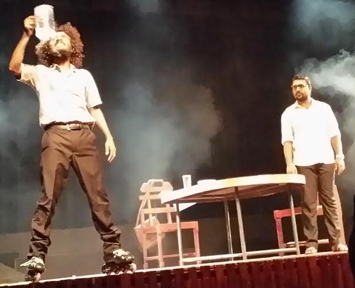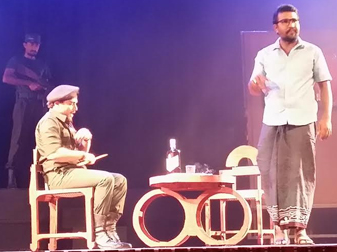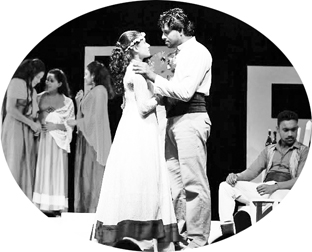|
DRAMA Review
Mr. W. Or the last days of Aththanayake:
Critique theatre at its compelling best
by Dilshan Boange
On March 15, students of the University of Visual and Performing Arts
presented 'Mr. W. Or The Last Days of Aththanayake'. Thus on the 'Ides
of March' (March 15) that marks the day of Julius Caesar's
assassination, they mounted on the boards of the Pani Bharatha
auditorium a compelling work of critique theatre that creatively
recreated the last days of the late leader of the JVP -Rohana Wijeweera
- when he lived incognito as 'Aththanayake'. The credit for academic
directorial supervision is owed to Dr. Saumya Liyanage, Piyal
Kariyawasam and Thusitha Laknath Galindawaththa.
 It
is a work of theatre potent in symbolic elements to creatively imagine
and retell a historical episode tainted in dubiety and debate. A
theatrical mosaic with a nonlinear discursive unbound to the realist
mould of linear storyline narrative, 'Mr. W' as a work of theatre is
gripping and would appeal to the senses of the general theatregoer.
Therein lies, I feel, how this play could prove to be a work appealing
to mass audiences and thereby prove 'problematic' or at least irksome to
certain 'political forces' of present, who may find to their
disadvantage what is theatrically discoursed. It
is a work of theatre potent in symbolic elements to creatively imagine
and retell a historical episode tainted in dubiety and debate. A
theatrical mosaic with a nonlinear discursive unbound to the realist
mould of linear storyline narrative, 'Mr. W' as a work of theatre is
gripping and would appeal to the senses of the general theatregoer.
Therein lies, I feel, how this play could prove to be a work appealing
to mass audiences and thereby prove 'problematic' or at least irksome to
certain 'political forces' of present, who may find to their
disadvantage what is theatrically discoursed.
Healing
"Bleeding is a part of life. And finding a means of healing the
bleeding is also a part of life," said a female apparition of a former
comrade of Wijeweera's. That line, in my opinion, captures the essence
of the ethos that lies at the heart of what drives all people's
revolutions.
The play presents history post the insurgency of '88-89, addressing
the late leader of the JVP with critical reflection to analyse the
reasons for his failure and what his movement moved towards. A
noteworthy criticism mounted by the play is how fratricidal infighting
bedevilled the progress of the JVP. On that same vein is the accusation
spoken through the character of a JVP strongman (killed for dissenting
in the first scene by his own comrades) appearing as a rollerblading
apparition, that Wijeweera was ineffective in winning over Sri Lanka's
rural peasantry through his propaganda methods, which relied on a
foundation of intellectualism rather than touching on the traditional
sensibilities that would appeal to the masses. What builds on as a
discourse through this line of critical reflection performed
theatrically is that the narrative posits the accusation that Wijeweera
caused the JVP to move from socialism to nationalism and abandon the
very fundamental premise their doctrine stands on.
One of the disabilities historical personae suffer from is the
inability to defend themselves against future criticism. And history
itself can be the subject of much intrigue to those who claim to seek
the truth of the past. Napoleon called history a 'fable agreed upon',
Churchill had said after World War II, "History will be kind to me for I
intend to write it." And Fidel Castro famously declared after he was
tried and convicted for attacking the Moncada Barracks, 'History will
absolve me'.
 History,
however is not kind to everyone. History can prove to be a brutal
adjudicator whose verdicts shift with the times. Mr. W is in one sense a
critique that reflects on well researched fact to create a critical
reappraisal of Rohana Wijeweera and his legacy in relation to what his
party has evolved into. How Wijeweera himself would respond to this
criticism if he could, one can only imagine. A striking element of
inter-textuality is where Hemingway's Santiago the protagonist in The
Old Man and the Sea is evoked as a circumspective comparison to
Wijeweera through a song like expression by a character who is an
erudite lady whose husband was a victim of the state's elimination of
radicals back in the '88-89 period. Santiago, who finally 'dreams of
lions' too wanted to pass on his craft and knowledge to the next
generation by mentoring Manolin the boy. And like Santiago who
relentlessly struggles against the 'tide' Wijeweera is seen in the light
of an unrelenting dreamer who doesn't throw in the towel. History,
however is not kind to everyone. History can prove to be a brutal
adjudicator whose verdicts shift with the times. Mr. W is in one sense a
critique that reflects on well researched fact to create a critical
reappraisal of Rohana Wijeweera and his legacy in relation to what his
party has evolved into. How Wijeweera himself would respond to this
criticism if he could, one can only imagine. A striking element of
inter-textuality is where Hemingway's Santiago the protagonist in The
Old Man and the Sea is evoked as a circumspective comparison to
Wijeweera through a song like expression by a character who is an
erudite lady whose husband was a victim of the state's elimination of
radicals back in the '88-89 period. Santiago, who finally 'dreams of
lions' too wanted to pass on his craft and knowledge to the next
generation by mentoring Manolin the boy. And like Santiago who
relentlessly struggles against the 'tide' Wijeweera is seen in the light
of an unrelenting dreamer who doesn't throw in the towel.
Impressions
Innovative stagecraft in the form of elements as a rotating platform
that could be dissembled, utilising effects of lighting, smoke and space
and also multimedia projection to create attractive impressions which
also functioned as narrative elements made the play deliver a dynamism
that captivated the eye. And the rollerblading character of the
apparition is also a noteworthy element of attraction in the fabric of
performance. When players who act as ordinary soldiers took on the task
or shall we even say 'role' of stagehands who handled props as scenes
shifted, there seemed in them a nuanced statement. It is the military
that is utilised to do the 'groundwork' at the behest of the highest
'controllers' of state authority, and in effect made to 'set the stage'
for the episode to follow. The military is believed to have been grossly
misused in the last leftist insurgency in the name of national security
by the political bigwigs in power at the time.
The end shows 'Mr. W' gaze at an array of still pictures sliding one
after the other as a visual parade projected before him through
multimedia projection. The key figureheads who founded international
leftism as well as the pioneers of Sri Lanka's leftwing politics appear
before him. The then the UNP regime's leadership against whom he and his
movement waged a guerrilla war passed before him. At the juncture when
the picture of the Minister of the Defence of the late 80s, the late
Gen. Ranjan Wijeratne, appeared, it created a striking moment, as 'Mr.
W' gazed upon the face of the redoubtable man who is credited for wiping
out the JVP led insurgency during the '88-89 period.
This work enters the fold of Sri Lankan theatre at a time when the
political landscape is pregnant with a potent public discourse on 'post
conflict reconciliation'. In this present climate, 'Mr. W' comes out as
a work of 'critique theatre' in no small measure. The late Rohana
Wijeweera's youngest child, his daughter, Ama, was a contemporary of
mine back in Colombo University. She once told me she has no
recollections of her father. She had been too small to remember their
days together as a family. I wondered that evening what Ama may have
felt if she had watched this play that speaks of a facet of her own
past, which she cannot own through personal memory.
I shall conclude this review by citing two lines that depict 'the
last moments of Julius Caesar' leading to his assassination in the Roman
senate, as creatively imagined by Shakespeare in his play Julius Caesar.
"Caesar: - The Ides of March are come.
Soothsayer: - Ay Caesar, but not gone."
Niyangala Premaya:
 When
love turns deadly When
love turns deadly
by Dilshan Boange
Young theatre practitioners Dinesh Sandaruwan and Sudesha Lakmali
staged their Sinhala rendition of Spanish playwright Federico Garcia-Lorca’s
Blood Wedding titled Niyangala Premaya at Tower Hall on March 14. The
title proved to be an interesting interpretation of the Spanish play and
very much indicative of a localised image device to speak of how love
can become deadly.
Niyangala after all is a poisonous root with a beautiful flower well
known to Sri Lankan sensibilities, and hence the title speaks of how the
roots of passion can be lethally toxic though the outward manifestation
of it can be captivating. The play speak of how unbridled passions
though however much adventurous and romantic they may seem, can lead to
despair. Pride, love, lust and bloodshed seem to be the themes that
define the course of events and their outcomes in this Spanish story,
which was presented by an amateur cast of actors whose performance was
fairly appreciable.
A minimalist set defined its stagecraft with some eye catching
costumes and lighting effects. The Sinhala dialogue was a curious
mixture of both literary stylistic parlance and colloquial speech. The
theatricality of performance however, seemed to befit the scheme of
variance in Sinhala lingual stratification in the text of the play. As
an amateur production Niyangala Premaya shows the potential of talents
in both actors and the directorial vision behind it. |

